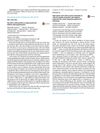 132 citations,
January 2017 in “International Journal of Molecular Sciences”
132 citations,
January 2017 in “International Journal of Molecular Sciences” Fat-derived stem cells show promise for skin repair and reducing aging signs but need more research for consistent results.
 6 citations,
April 2017 in “Experimental dermatology”
6 citations,
April 2017 in “Experimental dermatology” CD80CD86 deficiency causes hair loss by disrupting regulatory T cells.
23 citations,
January 2016 in “Frontiers in immunology” Using low-dose IL-2 to increase regulatory T cells might be a safe way to treat type 1 diabetes without severe side effects.
 16 citations,
October 2023 in “Molecular cancer”
16 citations,
October 2023 in “Molecular cancer” New treatments like nanotechnology show promise in improving skin cancer therapy.
 8 citations,
April 2020 in “Journal of Ethnopharmacology”
8 citations,
April 2020 in “Journal of Ethnopharmacology” Herbs might help with hair loss, but more research is needed to confirm their safety and effectiveness.
 June 2023 in “Dermatology and therapy”
June 2023 in “Dermatology and therapy” The Middle East and Africa need better data, treatment consensus, and support for Alopecia Areata.
 271 citations,
May 2019 in “Cells”
271 citations,
May 2019 in “Cells” The secretome from mesenchymal stem cells is a promising treatment that may repair tissue and avoid side effects of stem cell transplantation.
 2 citations,
January 2023 in “BioMed Research International”
2 citations,
January 2023 in “BioMed Research International” The secretome from mesenchymal stromal cells shows promise for improving facial nerve injury treatment.
 January 2025 in “International Journal of Molecular Sciences”
January 2025 in “International Journal of Molecular Sciences” Psoriasis involves immune and genetic factors, and understanding these can improve treatments.
 January 2018 in “Elsevier eBooks”
January 2018 in “Elsevier eBooks” The document concludes that alopecia has significant social and psychological effects, leading to a market for hair loss treatments.
 5 citations,
May 2023 in “Frontiers in immunology”
5 citations,
May 2023 in “Frontiers in immunology” Environmental factors like diet and vitamin levels, especially Vitamin D, can affect autoimmune diseases differently, with lifestyle changes potentially improving outcomes.
 December 2023 in “EPRA international journal of multidisciplinary research”
December 2023 in “EPRA international journal of multidisciplinary research” Alopecia areata causes sudden hair loss, has genetic links, and can be managed but not cured.
 October 2023 in “bioRxiv (Cold Spring Harbor Laboratory)”
October 2023 in “bioRxiv (Cold Spring Harbor Laboratory)” Immune cells are essential for early hair and skin development and healing.
 62 citations,
June 2015 in “The Journal of Dermatology”
62 citations,
June 2015 in “The Journal of Dermatology” People with alopecia areata have more Th17 cells and fewer Treg cells, which may be key to the condition's development.
16 citations,
January 2022 in “International journal of molecular sciences” Certain daily habits like stress, diet, and sleep can affect the severity of hair loss in alopecia areata.
 25 citations,
December 2021 in “Stem Cell Research & Therapy”
25 citations,
December 2021 in “Stem Cell Research & Therapy” MSCs and their exosomes may speed up skin wound healing but need more research for consistent use.
 47 citations,
May 2020 in “Cardiovascular Research”
47 citations,
May 2020 in “Cardiovascular Research” The document concludes that future heart disease research should account for sex-specific differences to improve diagnosis, treatment, and outcomes.
 9 citations,
December 2014 in “Neuropsychiatric Disease and Treatment”
9 citations,
December 2014 in “Neuropsychiatric Disease and Treatment” People with first-time vitiligo have lower levels of a certain brain protein compared to healthy individuals.
344 citations,
May 2018 in “EMBO journal” Phosphorylation controls TFEB's location in the cell, affecting cell metabolism and stress response.
 11 citations,
November 2012 in “Seminars in Cutaneous Medicine and Surgery”
11 citations,
November 2012 in “Seminars in Cutaneous Medicine and Surgery” Genetic factors affect hair loss, and molecular testing may help predict, diagnose, and treat it.
31 citations,
July 2021 in “ImmunoTargets and therapy” Alopecia areata is an incurable autoimmune condition causing hair loss, with research aiming for better treatments.
 77 citations,
July 2020 in “Journal of the European Academy of Dermatology and Venereology”
77 citations,
July 2020 in “Journal of the European Academy of Dermatology and Venereology” Environmental factors, hormones, nutrition, and stress all significantly affect skin health and aging.
 1 citations,
September 2013 in “Elsevier eBooks”
1 citations,
September 2013 in “Elsevier eBooks” Hair ages and thins due to factors like inflammation and stress, and treatments like antioxidants and hormones might improve hair health.
 15 citations,
October 2020 in “Journal of Investigative Dermatology Symposium Proceedings”
15 citations,
October 2020 in “Journal of Investigative Dermatology Symposium Proceedings” Platelet-Rich Plasma (PRP) could potentially help regrow hair in people with Alopecia Areata, but more research is needed to confirm its effectiveness.
51 citations,
October 2019 in “Cells” Baricitinib reduces inflammation and improves cell health in premature aging cells.
 76 citations,
August 2018 in “International Journal of Cosmetic Science”
76 citations,
August 2018 in “International Journal of Cosmetic Science” Dermal Papilla cells are a promising tool for evaluating hair growth treatments.
 146 citations,
January 2004 in “Hormones”
146 citations,
January 2004 in “Hormones” Human skin acts like a hormone-producing organ, making and managing various hormones important for skin and hair health.
 April 2024 in “Dermatovenerologiâ, kosmetologiâ”
April 2024 in “Dermatovenerologiâ, kosmetologiâ” Actinic keratosis is a sun-induced skin condition that can potentially turn into skin cancer and requires various treatments to prevent this.
 April 2017 in “Journal of Dermatological Science”
April 2017 in “Journal of Dermatological Science” B cells can both help and hinder the body's defense against melanoma.
1 citations,
January 2020 in “Indian journal of dermatology, venereology, and leprology” CD117 and platelet-derived growth factor receptor α may play a role in alopecia areata.
























